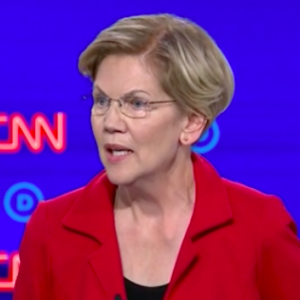If she becomes president, Elizabeth Warren plans to pay for her big projects (like universal child care and student loan debt forgiveness) with a 2-3 percent tax on American households with a net wealth greater than $50 million. The latest paper from her economic advisors estimates the potential future economic impact of such a tax and suggests “key steps” for implementation to mitigate potential downsides.
The Brookings paper, written by economists Emmanuel Saez and Gabriel Zucman — who are also Warren’s economic advisors — defines net household wealth as the sum of all financial and non-financial assets minus debts.
The paper directly addresses some of the top criticisms of Warren’s proposal: that wealth taxes failed in Europe (14 European countries had a wealth tax in 1996, but as of 2019, only six do) and that taxing the wealthy would reduce investments and slow economic growth in the long run.
According to Saez and Zucman, the European wealth taxes were fundamentally flawed because they were designed in the 20th century and relied on households’ self-assessment of wealth. They also were hindered by very low exemption thresholds “creating liquidity problems for some moderately wealthy taxpayers with few liquid assets and limited cash incomes.” Warren’s $50 million threshold would be substantially higher.
Furthermore, they argue, by “leveraging modern information technology, it is possible for tax authorities to collect data on the market value of most forms of household wealth and use this information to pre-populate wealth tax returns, reducing evasion possibilities to a minimum.” In other words, technology like social media would allow the government to assess and track the private property of private citizens and make it harder for them to hide their assets.
Saez and Zucman also believe that concerns about stifling investment and long-term economic growth are unfounded. By using the tax revenue to fund Warren’s projects, wealth inequality will stabilize, leading to more people with more money to invest.
But more importantly, they argue, their approach would make the American tax system more fair.
“The greatest injustice of the US tax system today is its regressivity at the very top: billionaires in the top 400 pay less (relative to their true economic incomes) than the middle class,” Saez and Zucman wrote. “This regressivity is the consequence of the erosion of the corporate and estate taxes, and the fact that the richest can escape the income tax by reporting only half of their true economic incomes on their individual income tax returns. A wealth tax with a high exemption threshold specifically targets the richest and could resolve this injustice.”
There’s still the question of enforcement, which Saez and Zucman say is a “matter of policy,” but other economists doubt Saez and Zucman’s calculations, arguing the tax wouldn’t bring in nearly as much revenue as Saez and Zucman claim.
Alan P. Viard, a resident scholar at the American Enterprise Institute (AEI), wrote a paper estimating that Warren’s tax would actually be much higher than originally thought.
“The best way to interpret wealth tax rates is to translate them into equivalent income tax rates,” he said. “For a taxpayer who holds a long-term bond with a fixed interest rate of 3 percent each year, a 2 percent per year wealth tax is equivalent to a 67 percent income tax and a 3 percent per year wealth tax is equivalent to a 100 percent income tax.”
This kind of tax burden, Michael R. Strain, AEI’s director of economic policy studies argues, “is the tax-equivalent of looting mansions” and “an abuse of government power.”
A preliminary paper, released in July by economists from the Treasury Department, Princeton, and the University of Chicago Booth but still in progress, estimates that Warren’s wealth tax may only raise half the revenue Saez and Zucman project.
Despite these criticisms, a University of Chicago Booth’s Initiative on Global Markets survey of 41 economists with a wide range of views, found that 25 “agreed” or “strongly agreed” the wealth tax would serve its intended purpose and alleviate wealth inequality in the U.S.
“It is important to note that progressive wealth taxes are fragile and susceptible to being undermined,” Saez and Zucman said. “The left could undermine its political support by lowering the exemption threshold too much and creating hardship for the illiquid merely rich. The right could then undermine its effectiveness by providing exemptions (and hence loopholes) for certain asset classes, or by imposing tax limitations based on income.”
To Strain, these caveats and criticisms amount to a “bad use of the tax code,” even if such a tax serves the noble purpose of improving Americans’ standard of living and chances of economic success.
“Paying taxes is not a punishment, and the tax code should not be used to penalize any group of citizens,” he said.

